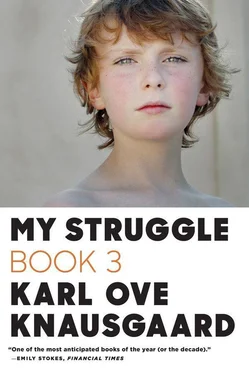That night I posed naked in front of the mirror for a long time.
It was easier said than done. The only full-length mirror we had was in the hall by the stairs. I couldn’t exactly stand there naked, even if there was no one in the house because someone could come at any moment and even if I reacted quickly they would still see my butt beating a swift retreat up the stairs.
No, it had to be the bathroom mirror.
But it was designed solely for faces. If you got up close and had your legs as far back as possible you could catch a glimpse of your body but from such a bizarre angle that it told you nothing.
So I waited until Mom had finished washing up after dinner and taken a seat in the living room with the newspaper and a cup of coffee. Then I went into the kitchen and fetched a chair. If she asked what I was doing with it, I could say I was going to put the cassette recorder on it while I was in the bath. If she asked why it couldn’t be on the floor as usual, I could say I had heard water and electricity were dangerous if they came into contact, and water often slopped on the floor when I had a bath.
But she didn’t ask.
I locked the door, undressed, placed the chair by the wall, and clambered up.
First I looked at the front of my body.
My dick wasn’t like Tor’s, not at all. More like a little cork. Or a kind of spring because it quivered when you flicked it lightly.
I put it in my hand. How big was it?
Then I turned and looked at it from the side. In fact, it seemed a bit bigger then.
Anyway, it looked like all the dicks in our class, apart from Tor’s, didn’t it?
I fared worse with my arms. They were so thin. And my chest was thin. I had a sudden image of it from a Norway Cup photo and the way it tapered the closer it came to my head. And that was definitely not how it was meant to be. I was supposed to do push-ups in training, but I always cheated because in reality, and only I knew this, I couldn’t do a single one.
I climbed down from the chair, ran the water into the bath, and while it splashed out from the tiny mouth under the miniature iron girder construction that the two eyes, one red and one blue, rested on, I hurried into my bedroom, grabbed the cassette recorder, inserted Outlandos d’Amour, which for me was bath music, put it on the chair, pressed play, and carefully stepped into the bathtub. The hot water stung my skin so much it was impossible to sit. But I managed. I sat, got up, sat, got up, sat, got up until my skin was used to the temperature and I could lie there letting the heat wash over me while the music poured from the little recorder and I sang at the top of my voice, dreaming about becoming famous and what all the girls I knew would say then. I feel lo lo lo, I sang. I feel lo lo lo, I feel lo lo lo. I feel lo lo lo, I feel lo lo lo, I feel lo lo lo. Lo, I feel lo. I feel lo. I feel so lonely. I feel so lonely. I feel so lonely lonely lonely lo. I feel so lonely lonely lonely lo. I feel so lonely lonely lonely lo. Lonely lone. Ah I feel SO LONELY! So lonely. So lonely. So lonely. So lonely. So lonely. I feel so lonely. I feel so lonely. I feel so lonely.
I caught every little nuance in Sting’s voice, even the whimper at the end. Now and then I banged my fists on the edge of the bath in my enthusiasm. When the song had finished I dried my hands on a towel, turned the cassette over, and wound forward to “Masoka Tanga,” another favorite of mine.
Oh, “Masoka Tanga”!
Afterward I stood in front of the wardrobe in my bedroom looking for clothes to wear. There were still some hours of the evening left.
It had to be the light-blue shirt with the white buttons and the dark-blue Levi’s.
“When are we going to buy clothes for the 17th of May?” I said to Mom, stopping in front of her in the living room.
“It’s only the end of March now,” she said. “We’ve got plenty of time.”
“Perhaps it would be cheaper now?” I said.
“We’ll have to see,” she said. “We haven’t got much money now, either, you know, as Dad is studying.”
“But we’ve got a little?” I said.
She smiled.
“Of course you’ll have new clothes for the 17th.”
“And shoes.”
“And shoes.”
The 17th of May was still the high point of spring for us, as Christmas was of the winter. At school we sang “Vi Ere En Nasjon Vi Med,” “Norge I Rødt,” “Hvitt og Blått,” and “Ja, Vi Elsker,” we learned about Henrik Wergeland and what happened at Eidsvoll in 1814. At home, ribbons and flags were taken out and all the flutes and horns we could find. On the day itself flags were hoisted on all the masts, and from very early morning families came out of their houses wearing traditional costume, dresses or suits, covered with capes or coats, as it was cold or raining, children with flags in their hands, now and then an instrument case, for quite a few of my neighbors played in marching bands and wore uniforms instead of their finery, which they changed into later. The uniform of the Tromøya school band consisted of a mustard-yellow jacket and black trousers with a white stripe down the sides and a black Foreign-Legion-style kepi on top. Their chests were festooned with medals acquired at the innumerable gatherings they had attended. Then car after car left front drives, onto the road and into Arendal, where you had to park well outside the center because people were trickling in from every direction and the streets were packed with crowds lining the long road along which the procession would pass. And the procession, that was us. We assembled in Tyholmen, beneath the standard of Sandnes School, which we were proud to walk behind in an almost endlessly long line consisting not only of all Arendal’s schools but all the schools in the district. Then we walked in two lines up and down the streets, in a sea of people, which you had to keep a constant eye on, because your parents, whom you had to wave to and who had to take a photo of you, could be anywhere.
That day, the 17th of May 1980, was different from all the other Constitution Days I had experienced. It was raining when we got up, and I was upset about that because I had to wear a waterproof anorak and trousers over my new clothes. I had been given light-blue Levi’s, a pair of white Tretorn tennis shoes, and a grayish-white, waist-length jacket. I was especially pleased with the jeans. Outside the houses up the hill there were sporadic protracted laments from the instruments the kids were carrying. Car doors slammed, shouts carried across garden paths, the atmosphere was feverish but expectant. As we approached the assembly area in Tyholmen, with the skies opening in unfailingly regular bursts of drizzle, it became clear that we would be walking side by side with a class from Roligheden School. I played soccer with some of them, but I had never seen many of the faces.
A girl turned.
She had wavy blonde hair, large blue eyes, and she smiled at me.
I didn’t smile back, but I held her gaze and then she turned forward.
The procession began to move. Somewhere far ahead a band was playing. One of our teachers began to sing and we joined in. After marching for perhaps twenty minutes many began to find their patience waning, especially the boys, we started laughing and fooling around, and when some boys used the flag to lift girls’ skirts, and the idea caught on, I made my way toward the blonde girl, along with Dag Magne, fortunately, so that I was part of something and not just on my own. I put the flag under the pleat of her skirt and lifted, she spun on her heel, held it down with one hand, and shouted, Don’t you dare, don’t you dare. But the eyes that looked at me were smiling.
I did it to some other girls as well, until it would no longer be suspicious if I approached her again.
Читать дальше












